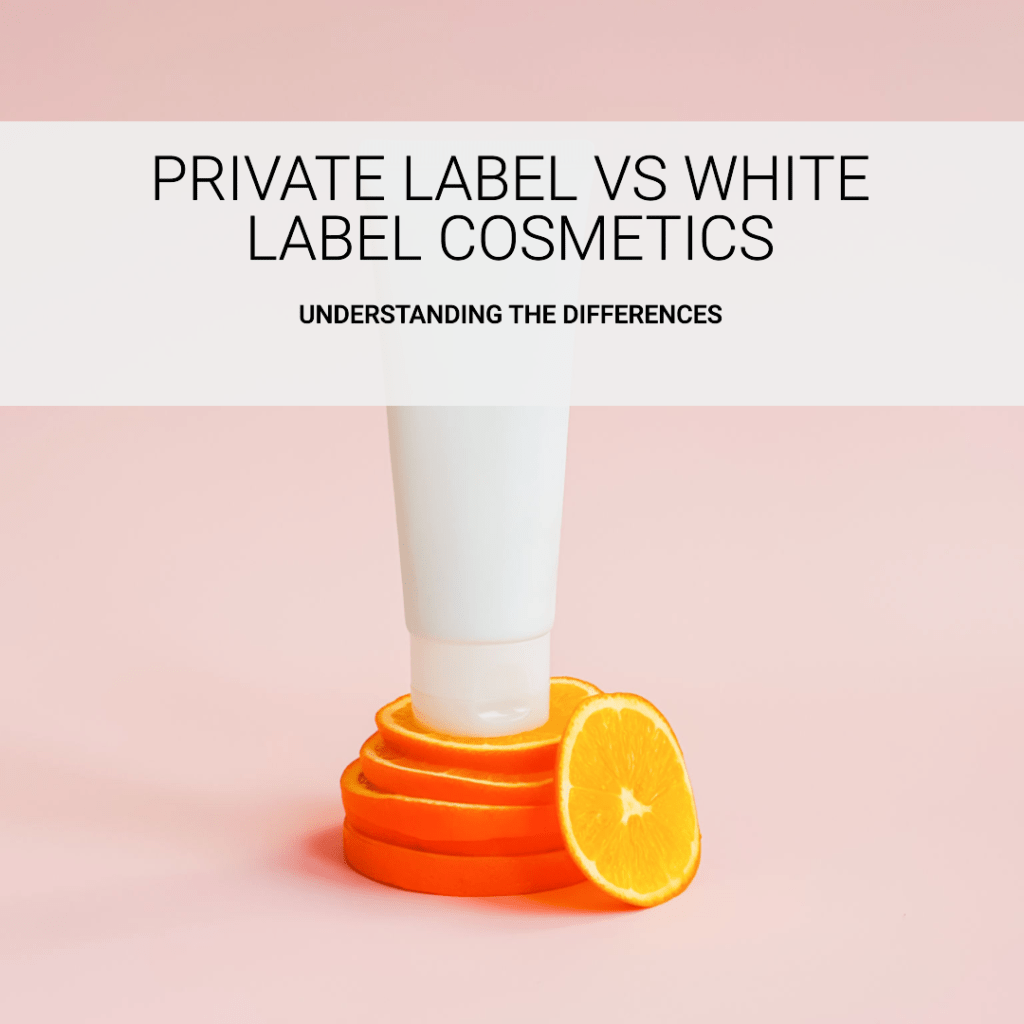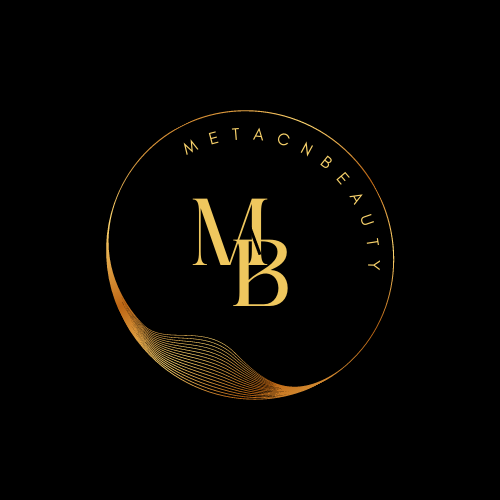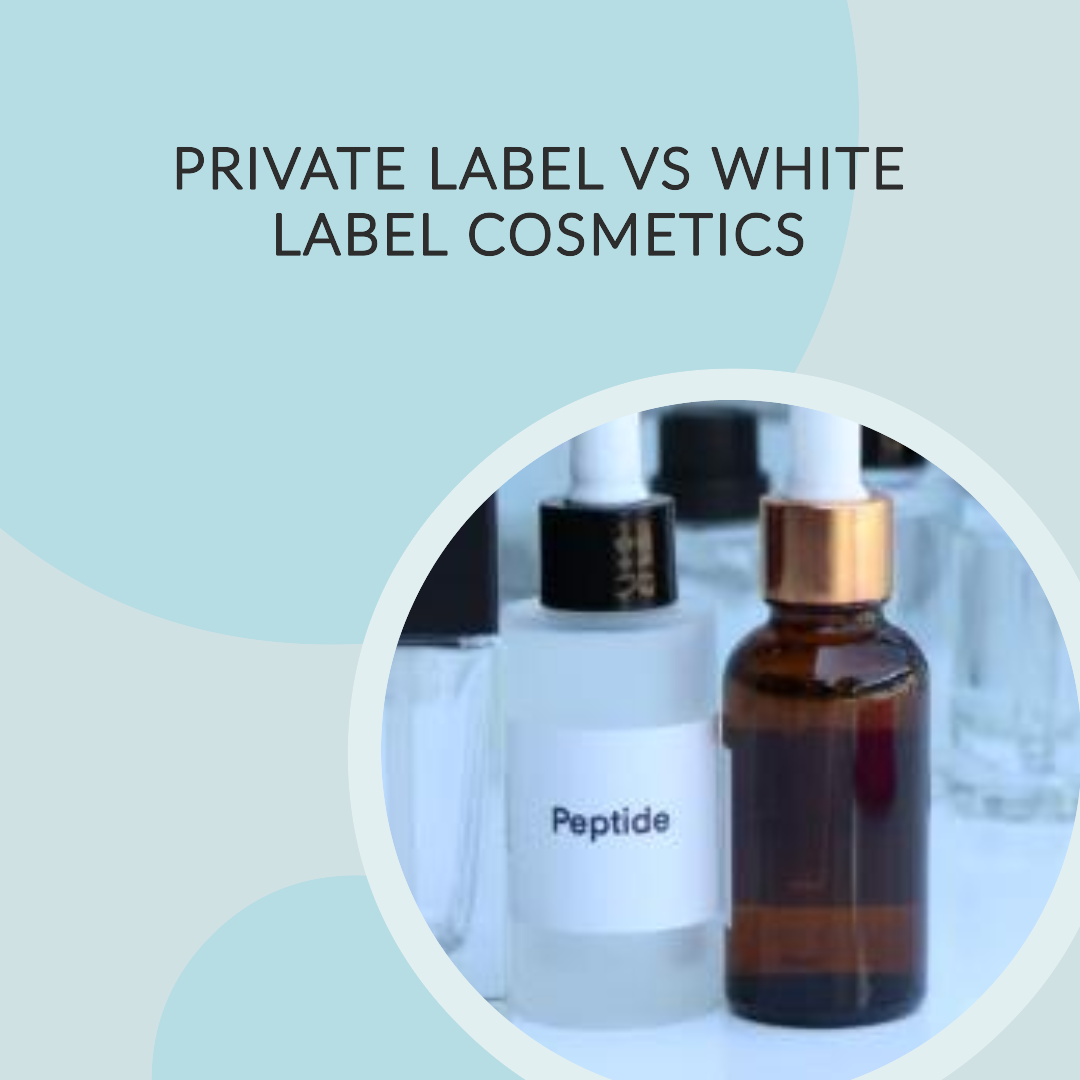Private Label vs White Label Cosmetics, In the ever-evolving world of cosmetics and beauty products, two terms that often crop up are "private label" and "white label." These concepts play a significant role in the cosmetics industry, dictating how products are created, branded, and brought to market. If you're looking to start your own cosmetics line or simply want to understand these terms better, you're in the right place. In this article, we'll delve deep into the distinctions between private label and white label cosmetics, shedding light on their unique characteristics, advantages, and disadvantages.

What Are Private Label Cosmetics?
The Definition
Private label cosmetics are products manufactured by one company but marketed and sold under the brand name of another company. In essence, it's like a ready-made product that you can label as your own. These cosmetics are typically produced by a manufacturer with expertise in formulating and creating beauty products. The purchasing company can then customize these products to align with their brand and marketing strategies.
The Advantages And Disadvantages Of Private Label Cosmetics
Advantages:
- Control: A retailer has full control over the product's specifications, packaging, and every other aspect.
- Exclusivity: Private label cosmetics are custom formulations made exclusively for a brand.
- Brand Image: Private label products can enhance the retailer's brand image as they are seen as the company's "own brand" of products.
Disadvantages:
- Time and Effort: Starting a business with private label cosmetics requires making several choices and devoting a lot of time.
- Cost: Private label manufacturing might require a higher investment compared to white label as you're creating a unique product.
What Are White Label Cosmetics?
The Definition
White label cosmetics refer to beauty products that are manufactured by one company and then sold under another company's brand. The term "white label" comes from the idea that the products are sold with a blank label, allowing the purchasing company to apply its own branding and sell the products as its own.
Here are some key characteristics of white label cosmetics:
Pre-made Formulations: White-label cosmetics are pre-made formulations that can be sold under a brand’s name.
Sold to Multiple Brands: These products can be sold to multiple brands.
Customizable Packaging: While the product itself is not customizable, the packaging and branding can be tailored to the purchasing company's specifications.
Cost and Time Effective: Opting for white label products can be quicker and cheaper as the product has already been designed, tested, and manufactured.
White label cosmetics offer businesses a way to expand their product line quickly without the need for extensive research and development or manufacturing facilities. However, it's important to note that while this can be a cost-effective and efficient way to expand a product line, it also means that other companies may be selling the same or very similar products.
The Advantages And Disadvantages Of White Label Cosmetics:
Advantages:
- Speed to Market: White label cosmetics offer a faster speed to market as the products are already formulated and ready for branding.
- Cost Savings: Businesses save costs by leveraging existing products from a third-party manufacturer.
- Risk-Free: When choosing a white label product, you know that it has been professionally manufactured and meets all industry guidelines and regulations.
Disadvantages:
- Limited Customization Options: Retailers can't interfere in the making of the product.
- Competition: The same product is sold to different sellers, so it might be harder to stand out from competitors.
- Lack of Information: It is harder for consumers to get information about the products and the companies that make them.
Private Label vs White Label Cosmetics: Key Differences

Private Label vs White Label Cosmetics : Private Label Cosmetics
- Private labeling is a practice where a manufacturer or brand sells its product exclusively to one retailer. the retailer can change the product in certain ways, such as by modifying the size or color.
- The retailers also typically handle all the marketing, publicity, and branding of the product.
- Private-label manufacturing offers you full control over the product’s formulation, including ingredients, texture, color, and scent.
- Private label cosmetics are custom formulations explicitly made for a brand.
- Private label cosmetics are exclusive to one brand.
Private Label vs White Label Cosmetics : White Label Cosmetics
- White labeling is the process of selling a generic product through multiple retailers and with various branding styles.
- A white label is a "blank label," so you can't change the product or what's inside the packaging, but you can customize how the product is labeled and packaged.
- With white labeled products, companies can sell their generic products through multiple retailers.
- White-label cosmetics are pre-made formulations that can be sold under a brand’s name.
- White-label cosmetics can be sold to multiple brands.
- White label can be quicker and cheaper as the product has already been designed, tested, and manufactured.
In summary, private label products are exclusive to one retailer and allow for more customization. In contrast, white label products are generic products that can be sold through multiple retailers with various branding styles.
The Advantages And Disadvantages Of Private Label vs White Label Cosmetics

Private Label vs White Label Cosmetics : When
Private Label vs White Label Cosmetics : When To Chose Private Label Cosmetics
Private label cosmetics offer a unique opportunity to create a product that truly reflects your brand’s vision and values. If you have specific preferences for texture, pigmentation, or ingredients, private label cosmetics allow you to customize these aspects to your liking.
For instance, if you’re passionate about natural ingredients, or if you want to offer a unique color range for a foundation, or even if you wish to add a touch of glitter to your nail polish range for that extra wow factor, private label cosmetics can make these ideas come to life.
With private label cosmetics, there are no compromises. You have the freedom to design the product and its packaging exactly as you envision. However, this level of customization comes with a higher cost as it involves direct intervention in the manufacturing process and fine-tuning of the product.
In conclusion, private label cosmetics are an excellent choice when you want full control over your product’s formulation and branding, and are willing to invest more for this level of customization. It’s all about creating a product that is uniquely yours.
Private Label vs White Label Cosmetics : When To White Label Cosmetics
White label cosmetics can be an advantageous choice in certain scenarios. While private label cosmetics offer a high degree of customization, they also come with their own set of challenges.
The development and production of private label cosmetics can be time-consuming, often requiring at least 2-3 months depending on the product. It demands a significant amount of experience, expertise, and a strong network to produce competitive cosmetics.
Moreover, the initial costs for private label cosmetics can be higher than white labeling since the products need to be specifically created and are not readily available in stock. There's also a risk of deviating too far from standard formulas, which could lead to resistance when marketing. Innovative cosmetic products typically require building your own clientele and market.
On the other hand, white label cosmetics offer a quicker and more cost-effective way to launch your own product line. These products are already developed, tested, and ready to be rebranded. This allows you to bypass the lengthy development process and high initial costs associated with private labeling.
In conclusion, white label cosmetics are an ideal choice when you want to quickly enter the market with a tried-and-tested product while keeping initial costs low. It's all about finding the right balance between cost, time, and customization.
Private Label vs White Label Cosmetics: Which One Is Right for You?
if you want to test an idea or sell to a few individual customers quickly, white labeling may be a better choice. On the other hand, if you want more control over the product formula and branding, private labeling might be more suitable. It’s best to weigh all pros and cons before making a decision.
Conclusion
Deciding between private and white label cosmetics is a significant choice that can greatly impact your business. It’s essential to consider whether the freedom and customization offered by private label cosmetics are crucial for your brand, or if the quick delivery and constant availability of white label cosmetics are more beneficial.
We can help you navigate this decision, leveraging our unique network of leading cosmetics manufacturers worldwide. Regardless of whether you choose private or white label cosmetics, we can swiftly connect you with the best possible company to meet your specific needs.
Take the next step towards creating your unique cosmetic line. Let’s explore the possibilities together and build a brand that truly resonates with your audience.
Get Start Your Cosmetics Brands Now
FAQs About Private Label vs White Label Cosmetics
What are the benefits of private label cosmetics?
What are the drawbacks of private label cosmetics?
What are the benefits of white label cosmetics?
What are the drawbacks of white label cosmetics?
How do I choose between private label and white label cosmetics?
Are private label cosmetics of lower quality compared to white label cosmetics?
Can I switch from private label to white label cosmetics or vice versa?
Are there any legal considerations when selling private label or white label cosmetics?
Labeling Regulations: The FDA regulates cosmetic labeling under the authority of both the Federal Food, Drug, and Cosmetic Act (FD&C Act) and the Fair Packaging and Labeling Act (FPLA). These laws and their related regulations are intended to protect consumers from health hazards and deceptive practices and to help consumers make informed decisions regarding product purchase.
Claims: Information on cosmetic labeling, including claims, must be truthful and not misleading. If a product is marketed with claims for purposes such as treating or preventing disease, or affecting the structure or function of the body—including the skin—it’s a drug according to the law, and it must meet the requirements for drugs.
Safety: Under the FD&C Act, cosmetics must not be adulterated or misbranded. For example, they must be safe for consumers.
Responsibility: It is the manufacturer's and/or distributor's responsibility to ensure that products are labeled properly. It is illegal to introduce a misbranded cosmetic into interstate commerce, and such products are subject to regulatory action.
FDA Approval: The law does not require cosmetic labeling to have FDA approval before cosmetic products go on the market, and FDA does not have a list of approved or accepted claims for cosmetics.
How can I find reliable manufacturers for private or white label cosmetics?
What are some successful examples of brands using private or white label cosmetics?
A5: Private Label Cosmetics:
Sephora Collection: Sephora’s in-house brand, known for offering a wide range of affordable and high-quality beauty products.
Ulta Beauty: As a leading beauty retailer, Ulta Beauty carries an extensive range of private-label cosmetics under its own brand name.
Target Beauty: Target has its own private-label beauty brand called "Target Beauty".
White Label Cosmetics:
Many of the cosmetics brands on the market today are made by just a handful of manufacturers. In some cases, they’re the exact same formulation. What sets them apart is the brand, packaging design, and perhaps the range of colors offered.
For example, Kylie Jenner’s cosmetics brand and Kim Kardashian’s makeup line are produced by Seed Beauty, a private-label company that is also responsible for ColourPop.

